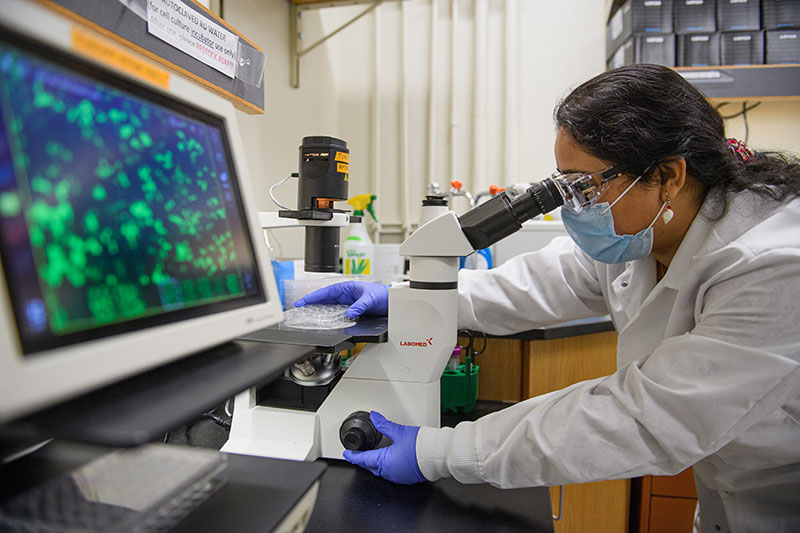What can I do with a major in Data Science?
Careers in Data Science

Scientists at Purdue University are using data science to help discover how the next generation of treatments for cancer may be found.
Business
Business Intelligence Analysts produce financial and market intelligence by querying data repositories and generating periodic reports. They devise methods for identifying data patterns and trends in available information sources.
Cost Estimators collect and analyze data to estimate the time, money, resources and labor required for product manufacturing, construction projects or services. Some specialize in a particular industry or product type.
Data Miners analyze data from different perspectives and summarize it into useful information – information that can be used to increase revenue, cut costs or both.
Foreign Exchange Traders look at the various factors that influence local economies and rates of exchange, and then take advantage of any misevaluations of currencies by buying and selling in different foreign exchange markets.
Management Analysts (management consultants) propose ways to improve an organization’s efficiency. They advise managers on how to make organizations more profitable through reduced costs and increased revenues.
Market Research Analysts analyze data to figure out what products are in demand, who wants them and what consumers are willing to pay for them.
Operations Research Analysts use advanced methods of analysis to help organizations solve problems and make better decisions.
Quantitative Financial Market Analysts work in finance using numerical or quantitative techniques.
Environment
Remote Sensing Scientists use sensors to analyze data and solve regional, national, and global problems in areas such as natural resource management, urban planning and climate and weather prediction.
Health
Public Health
Public health is the science of protecting and improving the health of people and their communities. This work is achieved by promoting healthy lifestyles, researching disease and injury prevention, and detecting, preventing and responding to infectious diseases.
Epidemiologists are medical scientists who investigate and describe factors that influence the development of disease, disability and other health outcomes. They formulate means for prevention and control.Law and Government
Cryptanalysts analyze and decipher secret coding systems and decode messages for military, political or law enforcement agencies or organizations.
Intelligence Analysts gather, analyze or evaluate information from a variety of sources, such as law enforcement databases, surveillance, intelligence networks or geographic information systems.
Research and Development
Astronauts train to pilot a spacecraft, travel in a spacecraft or work in space.
Data Analysts mostly work with an organization’s structured data. They create reports, dashboards and other visualizations based on data associated with customers, business processes, and market economics.
Market Research Analysts analyze data to figure out what products are in demand, who wants them and what consumers are willing to pay for them.
Statisticians develop or apply mathematical or statistical theory and methods to collect, organize, interpret and summon numerical data to provide useful information. They may specialize in fields such as biostatistics, agriculture, business or economics.
Technology
Big Data Engineers develop, maintain, test and evaluate big data solutions within organizations. Duties include resolving ambiguities in data, performance optimization, and data extraction.
Computer & Information Systems Managers plan, coordinate and direct computer-related activities in an organization.
Computer Programmers create, modify and test the code, forms and scripts that allow computer applications to run.
Computer Systems Analysts study an organization’s current computer systems and procedures and make recommendations to management to help the organization operate more efficiently and effectively.
Data Architects design systems for enterprise database systems and set standard for operations, programming, and security. They integrate new systems with existing warehouse structure and refine system performance and functionality.
Database Administrators use software to store and organize shipping records. They make sure that data are available to users and are secure from unauthorized access.
Enterprise Architects are responsible for supporting an organization’s IT networks and services. By utilizing complex thinking and strategizing, they ascertain which legacy systems require updates and which services or products are necessary to the organization’s operations.
Ethical Hackers conduct penetration testing of an organization’s systems and applications by utilizing creative thinking along with prerequisite cybersecurity knowledge.
Machine Learning Engineers design self-running software to automate predictive modeling. The software they create uses previous operations to increase accuracy of future modeling via machine learning.
Other
Psychometricians practice the science of measurement, or psychometrics.
- Career Development
- What Can I do with a Major In...
- Career Mapping System
- Personalize Your Career Plan
- Build a Professional Profile
- Internships and Research
- Job Search Resources
- Programs & Events
- Additional Career Resources
- Archived Newsletters
- Applying to Graduate School
- Reporting Your Post-Grad Plans
- Post-Graduation Data
- Alumni Profiles